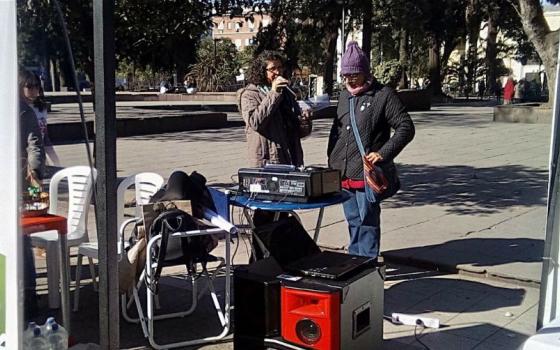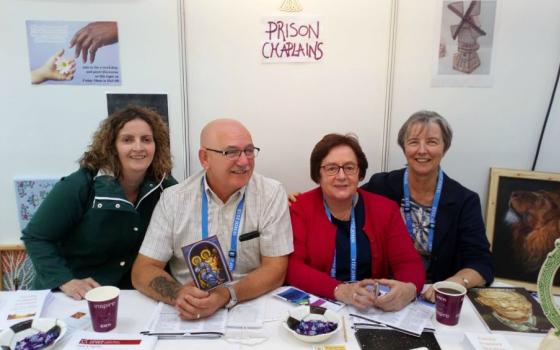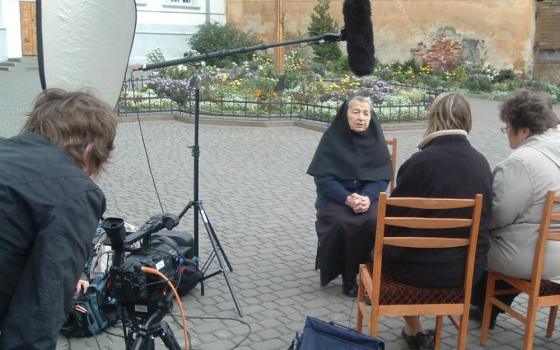The panelists for October all answered with a resounding "yes" in their responses to this month's question. But they had a variety of approaches and diversity of actions.
Do you think sisters should be politically active? Are sisters politically active in your country? Are you politically active? How?
______

Cecilia Oluchi Dimaku is in the Congregation of the Sisters of the Sacred Heart of Jesus, an indigenous institute in Nigeria. She previously held business positions in schools, the diocese and her community. After 12 years in leadership, she was missioned to the Sisters of the Holy Family in the United States, where she works as payroll and personnel coordinator at their academy in New Orleans.
As consecrated women, we are voice for the voiceless. Having an option for the poor and oppressed requires that we speak out against policies and structures that contribute to people's suffering, what Pope John Paul II called the "structures of sin."
While sisters participate in missions of charity, they must work to change unjust systems and structures and find ways to monitor and influence government entities that serve the people locally and nationally.
Corruption is primary among the many evils facing our country, Nigeria. Corruption has the attendant consequences of high unemployment, especially among young people. This in turn has given rise to the menace of trafficking in human persons, the rise of Boko Haram sects, the Fulani Herdsmen, and other evils Nigeria is experiencing today.
Nigerian sisters are actively involved in finding political, religious and social solutions to these problems. They represent the plight of the people, especially that of women, to local, state and national political leaders. Some Nigerian sisters are members of government committees set up to deal with religious crises in the country and to find ways to peacefully co-exist between Christians and Muslims.
Last year, sisters in Nigeria took the case of persistent violence and insecurity in Nigeria, especially as it affects women and children, to the Nigerian National Assembly. During elections, sisters conduct town hall meetings to enlighten and educate the electorate, most of whom are uneducated, on voters' rights and obligations.
Active involvement in politics does not have to mean running for or holding a political office. Sisters quietly make a difference in their local communities, mobilizing political awareness through grassroots involvement.
One of our sisters told me how she got the local power company to restore electricity to a village that had been without light for over six months just by organizing other sisters for a sit-in protest at the electricity board office to insist that light be restored to the village.
Active politics means being aware of our global and local realities, educating ourselves about political issues, and paying attention to genuine news about our country and elected officials and how they are keeping or not keeping their promises.
I call or write my representative about issues affecting my local community or my country. I am a member of groups that call the attention of government to issues about trafficking in human persons and care of our environment. This is my way of being an active participant in politics.

Mary Hanrahan, a Sister of the Presentation of the Blessed Virgin Mary in Dublin, ministered in teaching and administration in inner-city Dublin with disadvantaged teenage girls. She served one term on the provincial leadership team and two on the congregational level. She is currently employed as chaplain in a prison for men convicted of violent crimes.
The first International Congress of Parliamentary Women's Caucuses — female politicians representing more than 40 countries as well as activists, writers, artists and academics — was held in Ireland recently.
In his address to the group, our president said, "We can now speak of a fourth wave of feminism, a feminism global in its scale and in its ambition and universal in its solidarity, dedicated to confronting some of the most pervasive structures of oppression which yet still remain."
What has this to do with religious sisters being politically active? I think as women, we are all called to be part of this fourth wave.
The first politically active woman in our Presentation congregation was our founder, Nano Nagle. Defying the oppressive political regime of 18th-century Ireland, Nano, regardless of the objections of bishops and powerful family members, set up Catholic education for the poor children of her native city.
Despite numerous setbacks, she established a congregation that could go out onto the streets to pick up "the urchins" and bring them to education and, consequently, freedom and independence. At this time in Ireland, religious sisters were enclosed and cloistered. I don't think we can imagine anything more political set against a backdrop of fear and the threat of imprisonment.
On five continents today, sisters and friends of Nano (associates and co-workers) continue to reach out to those on the margins of society. I work as a chaplain in a prison for men convicted of sexual crimes, perhaps the most despised and marginalized human beings in society.
Nano urged us to go where no one else would go, and my choice to work with these men is my way of sharing my charism. Am I as politically active as my sisters who work on the Christian Peacemaker Team in Palestine, who set up children's parliaments in India, who are environmental activists or who are representatives at the United Nations?
My politicism may take a different form, but — as politics for me means making a difference to those forgotten or rejected by society — yes, I am a politician! My politics is about shedding some light and hope into the darkest corners and above all about sharing the strength and tenderness that is our gift as women.
Let's be part of the "fourth wave of feminism" that will confront oppression and make our founders smile!

Brenda Peddigrew is a Sister of Mercy of Newfoundland. A writer, speaker, high school teacher and director of adult faith development for St. John's Archdiocese, she collaborated with Diarmuid O'Murchu on Religious Life in the 21st Century. She facilitates chapters for congregations of men and women around the world.
Should sisters be politically active? Yes! Otherwise, how could any of us live the essence of what we claim is our calling to do justice, to speak for justice, to follow a God of mercy and justice? But while our call to justice is part of the essence of religious life, the daily living out of that commitment necessarily takes many forms.
Every country and political situation has its own nuances of the call to justice, and our distinctive circumstances dictate what that call needs to be. Traditionally, religious congregations have worked with the poor, with the uneducated and with the sick, but the world offers new challenges now:
1. The steady destruction of the Earth for our own use and benefit — our throwaway society — calls us to bring that awareness into the public conversation.
2. Justice for women is paramount in our time. Here in Canada, we were shocked to learn that female mail carriers make only half the salary of male mail carriers! Now we support the postal strike, inconvenient and disruptive as it will be.
3. The extent of sexual abuse by clergy and hierarchy in our church cries for justice. We need to be loud and truthful in our protest against this other aspect of the inequality of women.
In Canada, women of all religious congregations engage in some form of political activity against injustice. Our whole history has involved addressing many unjust situations. We have joined in protests and marched for causes, though with our aging communities, this form is rapidly diminishing. Canada's Catholic schools, hospitals and colleges that we built mostly have been sold to provincial governments, and many people don't even know how they were started.
But our work for justice does not end because we can no longer be present in a particular way. In my 70s now, I continue to express these values as best I can. As I slow down physically and begin to meet my own energy limits, I find myself more deeply aware of the equally powerful possibilities for "activism for justice" through prayer and contemplative presence.
In fact, now, my main work is offering teaching days for Canadian congregations: exploring together how focused silence and contemplative practice with common intention also work to bring about justice in the world. Physical limitations need not stop political involvement; it simply changes our means of doing so, for justice is as much a spiritual, transformative energy as it is a physically focused one. Perhaps even more so!

María Alejandra Leguizamón Schija is a Dominican Sister of the Holy Name of Jesus in Tucumán, Argentina. Her academic preparation includes a pastoral specialization with an area of focus related to human trafficking. She works in pastoral ministry but also with a diverse group called Kawsay Network that gives workshops for children and adults in border schools and neighborhoods.
I think that every attitude in life is political, with the understanding that the definition of politics is the care and defense of the common good.
Religious life has always been identified with the works of mercy: feeding the hungry, giving water to the thirsty, lodging the pilgrim, dressing the naked, visiting the sick and visiting the imprisoned. Attending to the vulnerable is the mission of religious life.
Any pastoral plan is a political plan, a "politics of the Gospel" where we put the poor or those whose lives are threatened at the center of attention. Today, those are migrants, environmental or political refugees, or people exploited through trafficking networks.
In my country, religious life has an important role in education and also in ministries of presence in impoverished neighborhoods. A well-known case in our country in 1990 involved María Soledad Morales from the northern province of Catamarca, a young woman found dead on the side of a road with signs that she had been drugged, raped and tortured.
She was a student from the school of a religious congregation, and when her companions and relatives began to walk around the central square of the city in silence (these were later called the Marches of Silence), the school director, Sr. Marta Pelloni, joined them. This simple but totally political and revolutionary action contributed to the fall of a corrupt dynasty of rulers who did not defend the common good.
Historically, religious have inserted themselves into poor neighborhoods to accompany and empower the people. At the beginning of 2000, our country suffered a major political and economic crisis. The poorest population had no jobs to feed and educate themselves, but religious communities helped them find meaning in their lives through faith.
Currently, in the work we have been doing as a team of the Kawsay Network in Tucumán, we are committed to the politics of the Gospel in the call to free people from all kinds of slavery, including human trafficking.
We believe that the better informed people are, the better care they can take of themselves. We target vulnerable populations for education: young people, parents and children from impoverished neighborhoods in our province.
Our political commitment is integrated. It is intercongregational, intervocational and intercharismatic because with these concrete actions, we care for the common good.

Judith Anne Zielinski, a Franciscan Sister of Sylvania, Ohio, is an award-winning television writer, producer and filmmaker. Formerly communications director for the Conference of Major Superiors of Men in Washington, D.C., she also worked for Family Theater Productions in Hollywood, California, and now directs faith and values programming for NewGroup Media in South Bend, Indiana.
Politics? Who, me? Blessed with a temperament and ministry that leans strongly toward the arts, part of me wants to flee from the realities of this contentious time in American history. But I am also a Franciscan, a peacemaker and a Gospel woman called to speak for the voiceless.
Every day, I am assailed by overnight tweets full of accusations and demeaning name-calling, political rallies galvanized by racism and rage, police brutality, and the death of civil discourse. In this "post-truth" era, blatant lies are offered up as reality, and the mainstream media is mocked as "fake news." Hard-won safeguards that once protected the worker, the retiree, the immigrant, the environment continue to erode.
How to live and act as a Franciscan in this maelstrom? What am I called to do as a religious, a writer, producer and filmmaker? Fight or flight? Engage or retreat? There are many options, but I have chosen to use words and images as creative tools in this struggle.
My television ministry allows me to tell stories that inform, inspire and liberate, programs that speak of and about Gospel values. I have produced programs focusing on communist political oppression of the church in Eastern Europe after World War II, the dedication of local women religious rebuilding and maintaining ministry for the poor in New Orleans after Hurricane Katrina, the long struggle of women and their families recovering from domestic abuse, the battle against institutionalized racism at a city's swimming pool that excluded its own African-American citizens, and hundreds of other stories of Christians living out the beatitudes.
The fifth chapter of Matthew urges us to be salt and light. These simple mandates inform my art-as-politics ministry.
Be salt. Be flavor. Be real. Shake awake the blandness of the status quo.
Be light. Add clarity, not heat. Illuminate ignorance.
I am not called to be the Messiah; that job has already been taken. However, I contribute to the human procession, the groaning toward realizing the kingdom of God on Earth. I am called to participate, to do what I can, where I can, how I can, especially by using the arts. Watching from the sidelines is not allowed.
As wisdom culled from various parts of the Jewish tradition challenges me:
Do not be daunted by the enormity of the world's grief.
Do justly now.
Love mercy now.
Walk humbly now,
You are not obligated to complete the work,
But neither are you free to abandon it.

Tarianne DeYonker is a Dominican Sister of Adrian, Michigan. She has ministered as a teacher, administrator, public speaker, marriage and family therapist, and program developer. She also served as vicaress and general councilor for her congregation. She is currently beginning a ministry in Adrian in vocation work and also facilitates creative writing workshops.
All citizens should be politically active as they are able. My Dominican Sisters of Adrian, Michigan, are no exception. From our founding, political involvement and attempts to shape communities of justice are ways we preach the Gospel. Space limits my description of all of our efforts, but here are some examples from the United States, the Dominican Republic and the Philippines.
Network, a Catholic social justice organization, was founded in Washington, D.C., in 1971 by a group of U.S. women religious, including our sisters, Dominican Sr. Patricia Siemen and Dominican Sr. Carol Coston. We have engaged with them in political actions for social justice at the federal level. Network inspired our activism to create a more just world by tackling the knotty issues of racism, civil rights, poverty, war, freedom and the role of women.
Commitment to immigration reform led immigration attorney Dominican Sr. Attracta Kelly to establish the Office for Immigration Assistance on our Adrian campus to help immigrants with low incomes gain appropriate legal status. Others advocate at the Mexico border and in Chicago courts, witnessing our steadfastness with those whose voices need to be heard.
Our sisters in the Dominican Republic worked with people living in poverty, often taking an advocacy role to secure clean water, arable land or housing. When they made demands of the government or corporations, the sisters stood with them. Today, Srs. Basilia de la Cruz, Maria Eneida Santiago and Neri Sori along with lay partners conduct a 1,500-student school in Bani, a poor rural area. This high-quality pre-K through high school is well-regarded by parents and exudes hope.
Our Filipina sisters minister in the northern mountains with indigenous people, the Aetas. Sisters provide basic food needs and education. Recently, foreign mining companies have taken over and destroyed lands on which Aetas depend for their survival. Dominican Sr. Antoinette Lumbang spoke of her fear of being in a standoff with mining officials, especially when cameras surveyed the assembled group of protesters. Because of recent on-the-spot drug killings by police and military at the behest of the government, fear is rampant. Whether sisters would be killed for standing with these folks is not clear.
Two other commitments we have include actions to mitigate the effects of climate change and education on the prevalence of racism's influence, which motivates us to join protests, letter-writing efforts and advocacy for those whose rights and dignity are trampled.




